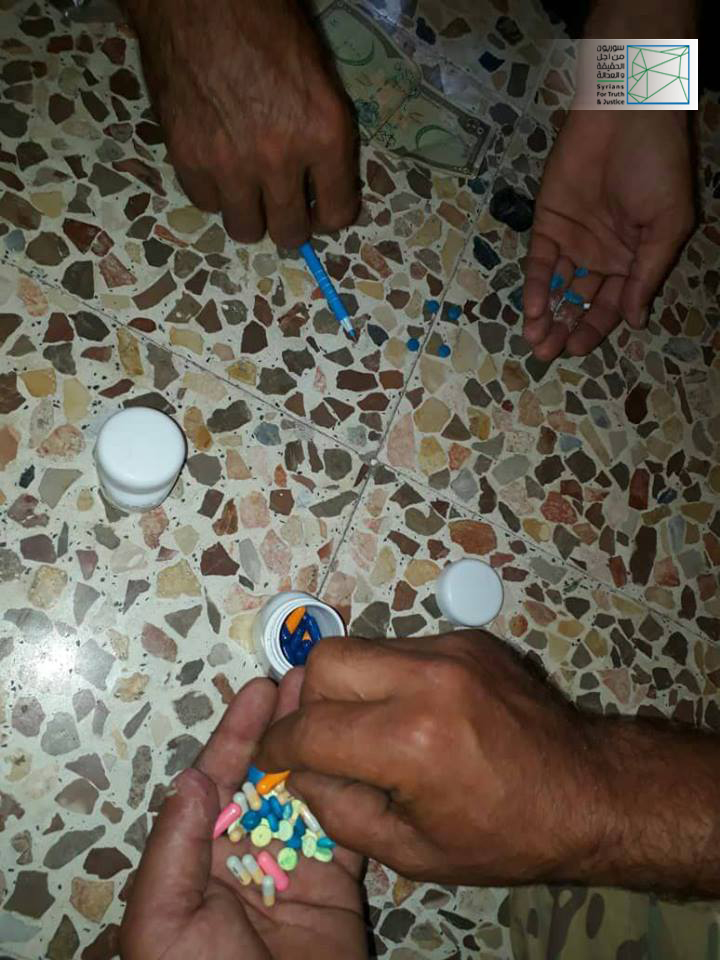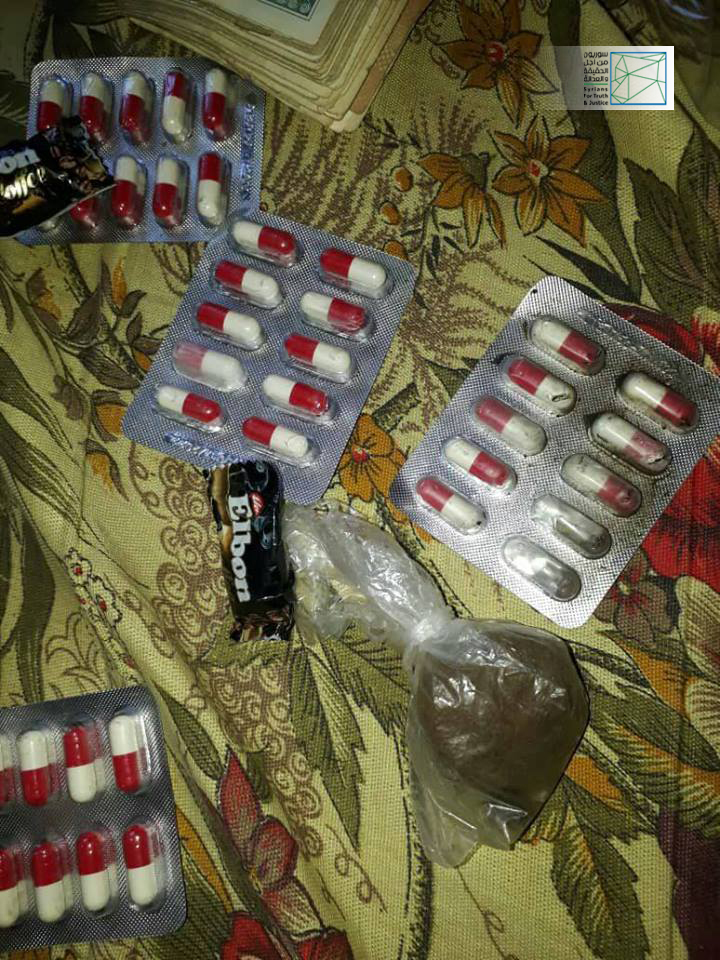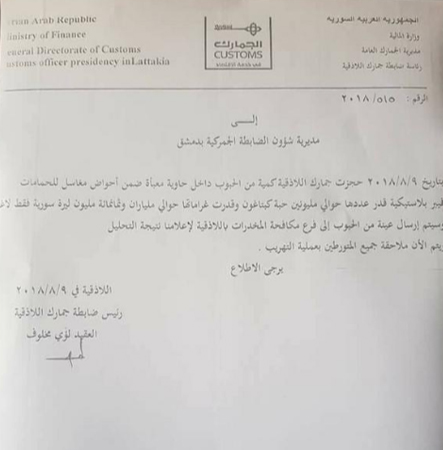Introduction Drug abuse[1] increased markedly in the rebel-held Hama and Idlib countryside[2], especially among children and youths between 16 and 30, due to insecurity[3] and spread of unlicensed pharmacies.
Numbers of drug users estimated at 200.000 persons in Idlib alone while in Hama countryside 20% of children and youths are addicts, with a single ill-equipped drug treatment center in the area, doctors and eyewitnesses reported.
Armed opposition groups controlling the countryside of Hama and Idlib started taking actions against drug dealers and managed to arrest 200 of them during the last three months.
The United Nations Office on Drugs and Crime (UNODC) stated in its latest World Drug Report[4] that a minimum of 190,000 drug related premature deaths occurred in 2017, mostly opioid-related which could have been avoided. The report also highlighted the fact that injecting drugs further aggravating health risks (e.g. HIV, viral hepatitis and tuberculosis).
Drug abuse spread into the Syrian Democratic Forces (SDF)-controlled areas specifically to cities of Raqqa and Tabqa and its surroundings where an estimated of 20% of children, locals and displaced, use and deal drugs[5], especially pills which are sold cheaply, with no serious measures taken by authorities to stop such actions. [6]
-
The widespread use of drugs among children and youth in Hama countryside
“I found myself trapped in a downward spiral of addiction, but I could overcome it”, said by Mohammed al-Ahmad, 18, belongs to a modest family from Sahl al-Ghab area[7], Hama countryside, after getting clean from pills he used to take for a whole year:
“I would attend school, but I dropped after mine in Sahl al-Ghab was bombed in 2017. There was nothing to do then. I started going out with some guys and take Zolam, Captagon and Baltane pills everyday, which made us feel carefree, relax and happy, I did not realize that I would end up addict. At first, we used to buy each pill for SYP 50, then its price reached SYP 1000, due to the high demand. Day by day, I started feeling sick and exhausted, my health seriously deteriorated and I was hospitalized as a result. Doctors told my family that I was so due to drug abuse and advised me to quit, or I would die otherwise. Indeed, I managed to stop taking pills after one month and a lot of suffering.”
Mohammed al-Khalaf, 36, married with children, is another witness from Sahl al-Ghab, who started using drugs in 2014, until he fell ill on June 4, 2018 and was hospitalized as a result to the addiction treatment center in Kafr Nabl, Idlib countryside.
"It all started when a buddy gave me a tramadol pill after I told him that I was tiered, it made me feel so good. Therefore, I started taking one pill a day and then the number increased to 4 or 5 until I got used. One night, I had a sharp pain in stomach and other parts of my body and transferred as a result to the addiction treatment center where I underwent check-ups and analysis which showed that I had liver cirrhosis. I received a month and 10 days long treatment, and I could recover."
-
Over 200,000 addicts in Idlib alone
Mohammed al-Zafer, a reporter from Sahl al-Ghab, confirmed to STJ that the prevalence of the unlicensed pharmacies which sell pills over-the-counter, is a major cause behind the spread of drug abuse:
"The use of Tramadol, Captagon, Baltane, Morphine and other pills, smuggled from regime-held areas, rising in Sahl al-Ghab.
Al-Zafer goes on to say that war conditions including insecurity, absence of legislations and displacements along with the presence of greedy dealers who are taking advantage of such situation, led the drug abuse to spread mostly among youths between 16 and 25:
"The suprresion of drug traficking is not that easy. Security authorities of the Syrian opposition should track down the drug runners and impose control on pharmecies. About 5 moths ago, the security committee in Qalaat al-Madiq[8] raided several pharmecies in Sahl al-Ghab and forced the pharmacists to sign a pledge not to sell narcotic substances without medical prescription. Moreover, a drug mule was arrested a in al-Sharia town in Hama countryside, while others are still followed by authorities.”

Pills seized in Hama countryside in Oct. 2018.
Photo credit: STJ.
Nizar Kishto, a pharmacist from Idlib countryside, said that some non-synthetic drugs, including hashish, have spread in Hama and Idlib countryside and became the choice for teens. Reports implicating regime forces in the entry of drugs into Hama and Idlib countryside in collaboration with mean-spirited people:
“Drug abuse rises due to the adverse security conditions and the lack of parental care, besides the proliferation of unlicensed pharmacies run by greedy unqualified persons who sell drugs without a prescription only for money. In my opinion, every pharmacist should register information of every prescription contains pain meds he gets, its date and the names of the patient and doctor, and stamp it to insure it won't be dispensed again.”
Nizar noted that some drug users bribe the doctors to write them narcotic medication prescription, and he stressed the need for drug treatment centers in the opposition-held areas in the Idlib and Hama countryside.

Hashish, seized in Hama countryside in Oct. 2018.
Photo credit: STJ
-
The single drug abuse treatment center in Hama and Idlib Countryside
Al-Ishraq Center, supervised by Dr. Saed Izz al-Din, is the only addiction treatment center in Kafr Nabl, Idlib countryside.
“Pain killers, like Tramadol and Morphine, are prescribed to those injured in the present war, who sometimes misuse them or given a wrong dose by doctors, which led to their addict. The center has estimated 20% residents of Idlib countryside to be drug abusers, about 150,000 or 200,000 persons. Every month, about 50 persons come to the center for treatment."
Dr. Mohammed al-Hasri from Kafr Nabl told STJ:
"Drug abuse started with the onset of the Syrian conflict and increased due to insecurity in the rebel-held areas. Many kinds of illicit drugs spread including cocaine and heroin, which were smuggled from regime-held areas in cooperation with drug runners."
-
Actions to deal with drug abuse
Jihad Qassom, head of the security and judicial committee[9] in Hama countryside affirmed that the illicit drugs are smuggled from adjacent regime-held areas such as al-Suqaylabiyah, Shathah, Ein ElKorum:
“Regime forces and mean-spirited people are the drug traffickers to the countryside of Hama and Idlib with the spread of unlicensed pharmacies who sell pills to vulnerable groups between 16-20 years old for 1500 or 2000 Syrian pounds. Six months ago, we, members of the security center, put a strategy for apprehending drug traffickers, we managed to arrest 3 and to brought them before the court. In addition, we conducted awareness campaigns to educate the population on the menace of drugs, consequently, some families brought their addicted children to the recovery center to undergo treatment programs."
Everyone abuses drugs will face arrest and every pharmacy sells drugs will be shut down, Qassom added.
Majidah al-Homsi, Head of Directorate of Drug Control of the Syrian Ministry of Health, stated that the most widely used drugs amongst youths in the regime-held territories are the hashish and stimulants, which have been smuggled easily from Lebanon in the latest years, due to the insecurity resulted from war. There is no accurate statistical information on the number of drug users, but the largest number is among youths, especially university and school students, Sputnik News published on March 3, 2018. [10]
Lattakia's General Customs Directorate seized about 2 million narcotic pills, which fine estimated at SYP 2.800.000.000, hidden inside basin bowls, and sent samples to the Drug Control Center of Lattakia for analysis.

The letter sent by Lattakia's General Customs Directorate regarding the seize of 2 million narcotic pills on Aug. 9, 2018.
Photo credit: media activists
[1] "Abuse" has referred to non-medical or unsanctioned patterns of use, irrespective of consequences. Thus the definition published in 1969 by the WHO Expert Committee on Drug Dependence was 'persistent or sporadic excessive drug use inconsistent with or unrelated to acceptable medical practice', World Health Organization, Abuse (drug, alcohol, chemical, substance or psychoactive substance), for more information, please click on: http://www.who.int/substance_abuse/terminology/abuse/en /
[2] The prominent groups in control of Hama and Idlib are Hayat Tahrir al-Sham (HTS), the National Front for Liberation, Jaysh al-Izza.
[3] "The Increased Incidents of Killing and Abduction Rise Fears among Civilians in Hama and Idlib", STJ, Oct. 17, 2018. https://www.stj-sy.org/en/view/881
[4] The World Drug Report of 2017, released by The United Nation Office on Drug and Crime (UNODC) .
[5]"Raqqa- Spread of Phenomenon of Selling and Promoting for Narcotic Pills in the Absence of Serious Steps to Prevent Them"
[6]"Raqqa- Spread of Phenomenon of Selling and Promoting for Narcotic Pills in the Absence of Serious Steps to Prevent Them", STJ, Aug. 14, 2018, https://www.stj-sy.org/en/view/694.
[7] The National Front for Liberation controls Sahl al-Ghab.
[8] Controlled by the National Front for Liberation.
[9] Affiliated to the National Front for Liberation.
[10] "Syria official reveals the most spread drug type amongst Syrian youths" Sputnik News site on March 6, 2018, https://arabic.sputniknews.com/arab_world/201803061030561856-%D8%B3%D9%88%D8%B1%D9%8A%D8%A7-%D9%84%D8%A8%D9%86%D8%A7%D9%86-%D9%85%D8%AE%D8%AF%D8%B1%D8%A7%D8%AA/

